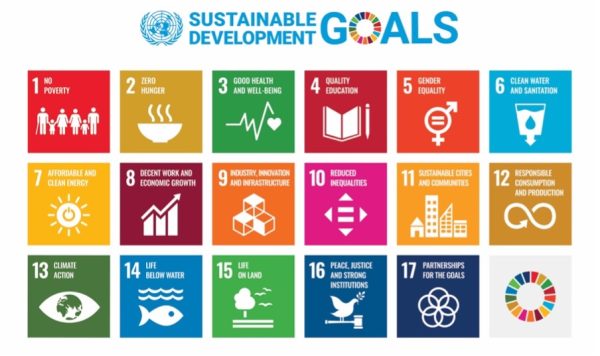Our PR Director, Michelle Smytheman, is passionate about helping emerging professionals in the communications industry and teaches at the University of the Sunshine Coast. As part of an assessment task this year, there have been some excellent blogs written by first-year students about emerging business trends. We are proud to share their work.
By Amber Henry
 With the rise of globalisation, individuals are now more aware than ever before of how their actions affect both the environment and society. The UN Sustainable Development Goals (SDGs) have taken centre stage in recent years as a crucial step towards sustainability worldwide. In this piece, we will explore what these goals entail. We will highlight their importance and explore ways everyone can contribute to achieving them. It’s imperative to note that the SDGs are not just about environmental sustainability, but also social and economic development.
With the rise of globalisation, individuals are now more aware than ever before of how their actions affect both the environment and society. The UN Sustainable Development Goals (SDGs) have taken centre stage in recent years as a crucial step towards sustainability worldwide. In this piece, we will explore what these goals entail. We will highlight their importance and explore ways everyone can contribute to achieving them. It’s imperative to note that the SDGs are not just about environmental sustainability, but also social and economic development.
The UN Sustainable Development Goals, established in 2015 and consisting of 17 objectives, aim to eliminate poverty, safeguard the environment and promote overall well-being worldwide. These targets are closely related and address numerous concerns such as starvation, healthcare access, education accessibility, gender parity, sanitation availability along with affordable clean energy sources for sustainable economic growth through innovative infrastructure. The goals also strive towards reducing disparities while promoting sustainability within urban communities. This is done by enforcing responsible production processes along with climate-conscious actions that protect marine biodiversity and land-based ecosystems. They seek to establish a peaceful world governed by equitable laws built upon robust institutions strengthened through purposeful partnerships. This is aimed at achieving these vital targets.
The UN Sustainable Development Goals clearly articulate a vision for a better world that addresses our most pressing issues. This includes reducing poverty and building strong institutions. Achieving these goals will not be easy, but it is one we must undertake if we want a sustainable and equitable future.
The importance of the SDGs cannot be overstated. They offer a comprehensive guide to building a brighter tomorrow for all, by tackling urgent issues like poverty, inequality, climate change and conflict head-on. Achieving these goals is only possible if we collaborate across sectors – governments, civil society groups, businesses and individuals must work hand in hand towards our shared vision of a more prosperous, equitable and sustainable world. Let us join forces today to make this future a reality!
The United Nations’ Sustainable Development Goals are of the utmost importance as they address numerous concerns and strive towards building a brighter future for all. These 17 objectives encompass various global challenges, including poverty reduction, environmental protection, gender equality, justice and fairness for all. Achieving these ambitious goals will require collaboration, innovation, and a deep commitment to sustainable development across all sectors of society.
As marketing evolves, lifestyle has become a crucial factor in determining buyers’ behaviour. Today’s consumers are more aware than ever of how their choices affect the environment and society. Considering this trend, businesses that offer products and services aligned with sustainable development goals stand out from competitors by appealing to those who prioritise sustainability in their lifestyles. Businesses can align with sustainable development goals by adopting innovative infrastructure that promotes affordable, clean energy sources. This reduces disparities while promoting sustainability.
With the rise of globalisation, individuals are now more aware than ever before of how their actions affect both the environment and society. The UN Sustainable Development Goals (SDGs) have taken centre stage in recent years as a crucial step towards sustainability worldwide. In this piece, we will explore what these goals entail. We will highlight their importance and explore ways everyone can contribute to achieving them. It’s imperative to note that the SDGs are not just about environmental sustainability, but also social and economic development.
 The UN Sustainable Development Goals, established in 2015 and consisting of 17 objectives, aim to eliminate poverty, safeguard the environment and promote overall well-being worldwide. These targets are closely related and address numerous concerns such as starvation, healthcare access, education accessibility, gender parity, sanitation availability along with affordable clean energy sources for sustainable economic growth through innovative infrastructure. The goals also strive towards reducing disparities while promoting sustainability within urban communities. This is done by enforcing responsible production processes along with climate-conscious actions that protect marine biodiversity and land-based ecosystems. They seek to establish a peaceful world governed by equitable laws built upon robust institutions strengthened through purposeful partnerships. This is aimed at achieving these vital targets.
The UN Sustainable Development Goals, established in 2015 and consisting of 17 objectives, aim to eliminate poverty, safeguard the environment and promote overall well-being worldwide. These targets are closely related and address numerous concerns such as starvation, healthcare access, education accessibility, gender parity, sanitation availability along with affordable clean energy sources for sustainable economic growth through innovative infrastructure. The goals also strive towards reducing disparities while promoting sustainability within urban communities. This is done by enforcing responsible production processes along with climate-conscious actions that protect marine biodiversity and land-based ecosystems. They seek to establish a peaceful world governed by equitable laws built upon robust institutions strengthened through purposeful partnerships. This is aimed at achieving these vital targets.
The UN Sustainable Development Goals clearly articulate a vision for a better world that addresses our most pressing issues. This includes reducing poverty and building strong institutions. Achieving these goals will not be easy, but it is one we must undertake if we want a sustainable and equitable future.
The importance of the SDGs cannot be overstated. They offer a comprehensive guide to building a brighter tomorrow for all, by tackling urgent issues like poverty, inequality, climate change and conflict head-on. Achieving these goals is only possible if we collaborate across sectors – governments, civil society groups, businesses and individuals must work hand in hand towards our shared vision of a more prosperous, equitable and sustainable world. Let us join forces today to make this future a reality!
The United Nations’ Sustainable Development Goals are of the utmost importance as they address numerous concerns and strive towards building a brighter future for all. These 17 objectives encompass various global challenges, including poverty reduction, environmental protection, gender equality, justice and fairness for all. Achieving these ambitious goals will require collaboration, innovation, and a deep commitment to sustainable development across all sectors of society.
As marketing evolves, lifestyle has become a crucial factor in determining buyers’ behaviour. Today’s consumers are more aware than ever of how their choices affect the environment and society. Considering this trend, businesses that offer products and services aligned with sustainable development goals stand out from competitors by appealing to those who prioritise sustainability in their lifestyles. Businesses can align with sustainable development goals by adopting innovative infrastructure that promotes affordable, clean energy sources. This reduces disparities while promoting sustainability.




